One of my favorite ways to celebrate Black History, Black present, and Black Excellence is by sharing information about Historically Black Sororities and Fraternities – The Divine Nine.
I want to share this information with you because it is likely different from all the other narratives you’ve heard when studying Black history and Black present. I want to share this with you because the torch that was lit by founders of Black Greek organizations over 100 years ago, still shines bright today. I want you to see the light so you can show it to, and celebrate it with your students.
Let’s jump right in with an overview of Black Greek Life and then I will share some information about each of the individual organizations and one well known person from each organization.
An Overview of Historically Black Fraternities & Sororities
There are nine Black Greek Sororities & fraternities, respectively that make up the (NPHC) National Panhellenic Council. In order of their founding, they are Alpha Phi Alpha, Alpha Kappa Alpha, Kappa Alpha Psi, Omega Psi Phi, Delta Sigma Theta, Phi Beta Sigma, Zeta Phi Beta, Sigma Gamma Rho, and Iota Phi Theta. They are often collectively called the Divine Nine.
These historically Black fraternities and sororities are deeply rooted in service, academic achievement and scholarship, social uplifting, and preserving traditions of the past while embarking on a journey toward innovation for the future. During the pledge process you learn about the richness of the legacy of Black Americans, honor the culture of intelligence, excellence, social and political change, hone the principles of sisterhood and brotherhood, and explore opportunities to serve. Once you are in the chapter, there is a focus on uplifting and supporting the collegiate community and serving the surrounding community. After graduation, collegiate members are encouraged to join the alumnae chapters to continue building, developing, and growing in the organization for a lifetime.
These organizations have literally changed the lives of thousands of men, women, and non binary persons across the nation and across the world for over a hundred years. I am one of those people. I am a devastating diva of Delta Sigma Theta Sorority, Inc. I crossed at Miami University – OH in Spring 2003 with 7 other dynamic women.
It is my honor and distinct pleasure to share this information about organizations filled with people who have become some of the greatest change makers our world has seen. So many people that are leaders in today’s world and in day’s past are members of these orgs. You may not have even been aware. Pledging one of these organizations, becoming a part of a unique brotherhood or sisterhood, designing community service and public service events gave these leaders a start and a safe place to hone their leadership and communication skills. It surrounded them with a very special group of men, women, and non binary persons who will support them for a lifetime. It gave them a space to learn how to effectively amplify and lift up the needs and voices of the BIPOC community.
The Divine Nine
So let’s begin the story.
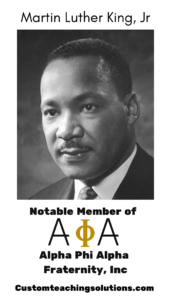 Alpha Phi Alpha Fraternity, Founded 1906, Cornell University in Ithaca, New York by seven men known as “the jewels” of the fraternity. Alpha Phi Alpha was founded during a time when there was racial prejudice and unrest in academia and in society. The college educated men that gathered originally met to study and support each other. That study group developed into a brotherhood that has uplifted, supported, and championed the Black community for 116 years and inspired many others to come. Alpha has several community outreach programs. Two of them include “A Voteless People is a Hopeless People” and “Go to high school – go to college”. Because MLK Day has recently passed, I will note that Martin Luther King, Jr. was a member of Alpha Phi Alpha. However, I want to recognize another notable member. I’m talking about a change maker, a civil rights activist, a Supreme Court Justice and lawyer for the Brown v Board of Education case in 1954. Can you guess who I’m talking about? If you said Thurgood Marshall then you are correct.
Alpha Phi Alpha Fraternity, Founded 1906, Cornell University in Ithaca, New York by seven men known as “the jewels” of the fraternity. Alpha Phi Alpha was founded during a time when there was racial prejudice and unrest in academia and in society. The college educated men that gathered originally met to study and support each other. That study group developed into a brotherhood that has uplifted, supported, and championed the Black community for 116 years and inspired many others to come. Alpha has several community outreach programs. Two of them include “A Voteless People is a Hopeless People” and “Go to high school – go to college”. Because MLK Day has recently passed, I will note that Martin Luther King, Jr. was a member of Alpha Phi Alpha. However, I want to recognize another notable member. I’m talking about a change maker, a civil rights activist, a Supreme Court Justice and lawyer for the Brown v Board of Education case in 1954. Can you guess who I’m talking about? If you said Thurgood Marshall then you are correct.
 Alpha Kappa Alpha Sorority, Founded 1908, Howard University in Washington, DC by sixteen women. These women came together during a time when few women, let alone Black women were enrolled at a college or university. Their desire was to bring like minded women together for the purpose of mutual uplift, and coalescing their talents and strengths for the benefit of others. To that end, the sorority built 10 schools in Africa in the late 1990s. AKA was the first Black Greek Sorority. They blazed a trail for many sisterhoods to come. A notable member of AKA is our very first woman to be vice president of the United States of America. The first bi-racial woman to be vice president of the United States of America. She is Indian and Jamaican. A former California district attorney, attorney general, and U.S. senator. Can you guess who I am talking about? If you said Kamala Harris, then you are correct.
Alpha Kappa Alpha Sorority, Founded 1908, Howard University in Washington, DC by sixteen women. These women came together during a time when few women, let alone Black women were enrolled at a college or university. Their desire was to bring like minded women together for the purpose of mutual uplift, and coalescing their talents and strengths for the benefit of others. To that end, the sorority built 10 schools in Africa in the late 1990s. AKA was the first Black Greek Sorority. They blazed a trail for many sisterhoods to come. A notable member of AKA is our very first woman to be vice president of the United States of America. The first bi-racial woman to be vice president of the United States of America. She is Indian and Jamaican. A former California district attorney, attorney general, and U.S. senator. Can you guess who I am talking about? If you said Kamala Harris, then you are correct.
 Kappa Alpha Psi Fraternity, Founded 1911, Indiana University by 10 collegiate men. These men formed Kappa during a time when racism, prejudice, and segregation ran rampant in Indiana. Black students were allowed to go to class and run track, if they were athletically inclined. But they were not allowed to stay on campus and were not provided off campus housing either. These men were not a part of the social scene. They were missing out on the benefits of college outside of academics. The founders of Kappa saw that Black men on campus needed academic support and socialization. Thus the journey of forming a fraternity where the fundamental purpose is achievement in every field of human endeavor began. In 2019 Kappa partnered with the Room to Read program. Each month children in an under-resourced elementary school are introduced to a Room to Read South Africa storybook title through a read aloud by one of the fraternity members. They also engage the students in reading activities and donate 10 copies to the school’s library. A notable member of Kappa is tennis legend, civic activist, the only Black man to ever win the singles title at Wimbledon, the US Open, and the Australian Open. Can you guess who I am talking about? If you said Arthur Ashe then you are correct.
Kappa Alpha Psi Fraternity, Founded 1911, Indiana University by 10 collegiate men. These men formed Kappa during a time when racism, prejudice, and segregation ran rampant in Indiana. Black students were allowed to go to class and run track, if they were athletically inclined. But they were not allowed to stay on campus and were not provided off campus housing either. These men were not a part of the social scene. They were missing out on the benefits of college outside of academics. The founders of Kappa saw that Black men on campus needed academic support and socialization. Thus the journey of forming a fraternity where the fundamental purpose is achievement in every field of human endeavor began. In 2019 Kappa partnered with the Room to Read program. Each month children in an under-resourced elementary school are introduced to a Room to Read South Africa storybook title through a read aloud by one of the fraternity members. They also engage the students in reading activities and donate 10 copies to the school’s library. A notable member of Kappa is tennis legend, civic activist, the only Black man to ever win the singles title at Wimbledon, the US Open, and the Australian Open. Can you guess who I am talking about? If you said Arthur Ashe then you are correct.
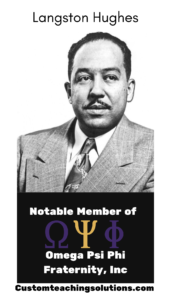 Omega Psi Phi Fraternity, Founded 1911, Howard University in Washington, D.C. by three undergraduate men and one faculty advisor. Bonding under the motto, “Friendship is essential to the soul”, these men formed the first Black Greek organization to be founded and incorporated on a Historically Black College campus. In 2018 The men of Omega Psi Phi hosted the Charles R. Drew blood drive in conjunction with the American Red Cross to honor the first African-American Red Cross medical director. A notable member of Omega is one of the best basketball players of all time and certainly one of the most recognized names in the NBA. He is not only an athlete, but a businessman, actor, philanthropist, and author. Did you guess Michael Jordan? If you did, you are correct.
Omega Psi Phi Fraternity, Founded 1911, Howard University in Washington, D.C. by three undergraduate men and one faculty advisor. Bonding under the motto, “Friendship is essential to the soul”, these men formed the first Black Greek organization to be founded and incorporated on a Historically Black College campus. In 2018 The men of Omega Psi Phi hosted the Charles R. Drew blood drive in conjunction with the American Red Cross to honor the first African-American Red Cross medical director. A notable member of Omega is one of the best basketball players of all time and certainly one of the most recognized names in the NBA. He is not only an athlete, but a businessman, actor, philanthropist, and author. Did you guess Michael Jordan? If you did, you are correct.
 Delta Sigma Theta Sorority, Founded 1913, Howard University in Washington, D.C. by 22 women who had a desire to not only support each other academically and socially, but to prioritize public service. For this reason, their first act was participating in the Suffrage March of 1913. From that day forward, Delta has sought to be on the forefront of political and social change in our world. In 2003, they were the first Black Greek organization to become a Non-governmental organization by the United Nations. A notable member of Delta was the first Black woman to be elected to the United States congress, she also became the first Black candidate for a major nomination and the first woman to run for the Democratic party’s nomination in 1972. Do you know who I’m talking about? If you guessed Shirley Chisolm, then you are correct.
Delta Sigma Theta Sorority, Founded 1913, Howard University in Washington, D.C. by 22 women who had a desire to not only support each other academically and socially, but to prioritize public service. For this reason, their first act was participating in the Suffrage March of 1913. From that day forward, Delta has sought to be on the forefront of political and social change in our world. In 2003, they were the first Black Greek organization to become a Non-governmental organization by the United Nations. A notable member of Delta was the first Black woman to be elected to the United States congress, she also became the first Black candidate for a major nomination and the first woman to run for the Democratic party’s nomination in 1972. Do you know who I’m talking about? If you guessed Shirley Chisolm, then you are correct.
 Phi Beta Sigma Fraternity, Founded 1914, Howard University in Washington, D.C. by three undergraduate students. These men desired to form a brotherhood that was truly inclusive and welcoming to men of all economic backgrounds, skin tones, and nationalities. They were devoted to what they call the “inclusive we” rather than the “exclusive we”. Their main objective is to use their newly acquired skills to uplift the community. In 1924 the Sigmas began the International Bigger & Better Business Initiative. The goal is to assist Black owned businesses with development, promotion, and growth. A notable member of Phi Beta Sigma, as noted on the Phi Beta Sigma website, was World famous scientist, botanist, educator and inventor whose studies and teaching revolutionized agriculture in the Southern United States; most famous for research into and promotion of peanuts and sweet potatoes. Were you thinking of George Washington Carver?! Then you’re correct. http://www.pbsad.org/notable-sigmas.html
Phi Beta Sigma Fraternity, Founded 1914, Howard University in Washington, D.C. by three undergraduate students. These men desired to form a brotherhood that was truly inclusive and welcoming to men of all economic backgrounds, skin tones, and nationalities. They were devoted to what they call the “inclusive we” rather than the “exclusive we”. Their main objective is to use their newly acquired skills to uplift the community. In 1924 the Sigmas began the International Bigger & Better Business Initiative. The goal is to assist Black owned businesses with development, promotion, and growth. A notable member of Phi Beta Sigma, as noted on the Phi Beta Sigma website, was World famous scientist, botanist, educator and inventor whose studies and teaching revolutionized agriculture in the Southern United States; most famous for research into and promotion of peanuts and sweet potatoes. Were you thinking of George Washington Carver?! Then you’re correct. http://www.pbsad.org/notable-sigmas.html
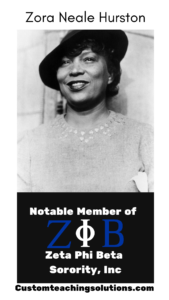 Zeta Phi Beta Sorority, Founded 1920, Howard University in Washington, D.C. by five collegiate women. These women wanted to create a sisterhood that did away with the trappings of elitism and socializing and focus specifically on raising the consciousness of their people, encouraging the highest standards of scholastic achievement, and fostering a greater sense of unity among its members so that they could help fight poverty, illness, and prejudice. As evidenced by several community based programs, but in particular the Stork’s Nest, a program that focuses on prenatal, health promotion for low income pregnant women, the Finer women are doing just that. A notable member of Zeta was an educator, anthropologist dedicated to studying and promoting Black culture, and a celebrated author in death. One of her works is “Their Eyes Were Watching God”. Do you think you know who it is? Did you guess Zora Neale Hurston? Then you are correct.
Zeta Phi Beta Sorority, Founded 1920, Howard University in Washington, D.C. by five collegiate women. These women wanted to create a sisterhood that did away with the trappings of elitism and socializing and focus specifically on raising the consciousness of their people, encouraging the highest standards of scholastic achievement, and fostering a greater sense of unity among its members so that they could help fight poverty, illness, and prejudice. As evidenced by several community based programs, but in particular the Stork’s Nest, a program that focuses on prenatal, health promotion for low income pregnant women, the Finer women are doing just that. A notable member of Zeta was an educator, anthropologist dedicated to studying and promoting Black culture, and a celebrated author in death. One of her works is “Their Eyes Were Watching God”. Do you think you know who it is? Did you guess Zora Neale Hurston? Then you are correct.
 Sigma Gamma Rho Sorority, Founded 1922, in Indianapolis, IN by seven young educators as a professional organization. In 1929 the organization became chartered as a collegiate sorority on the campus of Butler University in Indiana. It is the only NPHC member that began as a professional organization. For this reason, the women of Sigma Gamma Rho have a particular focus on supporting women in all stages of life and all walks of life. One way the SGRhos accomplish this is through several affiliate organizations that empower, encourage, and develop girls and women of all ages and backgrounds. Walking in step with their motto, “Greater service, greater progress”, the sorority facilitates programs like Swim 1922 in partnership with Swim America, a program designed to decrease the number of Black and Hispanic children that do not know how to swim. Members of the organization teach about water safety and how to swim. A notable member of SGRho is a non profit CEO, army officer, and the first officer to be crowned Miss USA in 2016. Do you know who I’m talking about? If you guessed Deshauna Barber, then you are correct.
Sigma Gamma Rho Sorority, Founded 1922, in Indianapolis, IN by seven young educators as a professional organization. In 1929 the organization became chartered as a collegiate sorority on the campus of Butler University in Indiana. It is the only NPHC member that began as a professional organization. For this reason, the women of Sigma Gamma Rho have a particular focus on supporting women in all stages of life and all walks of life. One way the SGRhos accomplish this is through several affiliate organizations that empower, encourage, and develop girls and women of all ages and backgrounds. Walking in step with their motto, “Greater service, greater progress”, the sorority facilitates programs like Swim 1922 in partnership with Swim America, a program designed to decrease the number of Black and Hispanic children that do not know how to swim. Members of the organization teach about water safety and how to swim. A notable member of SGRho is a non profit CEO, army officer, and the first officer to be crowned Miss USA in 2016. Do you know who I’m talking about? If you guessed Deshauna Barber, then you are correct.
 Iota Phi Theta Fraternity, Founded 1963, Morgan State University by 12 collegiate men. Unlike the other fraternities, Iota Phi Theta was founded by a group of men that was older than your traditional college students. Most of the founders were full time students and employees. Some also had families. Some were U.S. veterans. This life experience gave them a unique perspective when thinking about how to best support each other and their community. This led them to develop the motto: “Building a tradition, not resting upon one.” One of the many initiatives developed to support this mission is called I – S.H.I.E.L.D. Under this initiative, the brothers have developed programs to shine a light on, and work towards eliminating sexual assault and domestic abuse. One notable member of Iota Phi theta was a weather forecaster for ABC’s Good morning America from 1986 – 1998 and has written several children’s books. Did you guess Spencer Christian? Then you’re correct!
Iota Phi Theta Fraternity, Founded 1963, Morgan State University by 12 collegiate men. Unlike the other fraternities, Iota Phi Theta was founded by a group of men that was older than your traditional college students. Most of the founders were full time students and employees. Some also had families. Some were U.S. veterans. This life experience gave them a unique perspective when thinking about how to best support each other and their community. This led them to develop the motto: “Building a tradition, not resting upon one.” One of the many initiatives developed to support this mission is called I – S.H.I.E.L.D. Under this initiative, the brothers have developed programs to shine a light on, and work towards eliminating sexual assault and domestic abuse. One notable member of Iota Phi theta was a weather forecaster for ABC’s Good morning America from 1986 – 1998 and has written several children’s books. Did you guess Spencer Christian? Then you’re correct!
And there you have it. The Divine Nine. Nine organizations founded by people looking to uplift and serve the Black community and increase opportunities for empowerment and advancement both personally and professionally. Nine organizations continuing the legacy by developing the current generation and equipping the next generation of thought leaders.
What better way to show students the beauty of Black people and Black culture than through lessons about historically Black Greek organizations and the amazing brothers and sisters that carry out the missions behind each.
One thing I did while I was still in the classroom was introduce my students to these organizations. And many of the notable members. I would start right after we returned from winter break. I chose this time because many of the organizations celebrate their founding in the month of January. In addition, Black History month is in February and the lessons could continue. I would introduce one new organization per week.
My students LOVED it! This was not the typical Black history month lesson that they were getting in any other class. These were relevant and interesting and exciting.
It was important for me to share this information with students because I wanted them to see something both fun and impactful that Black people can create. I wanted them to see that people of color can gather in a peaceful, productive, and powerful way.
As an 8th grade teacher with students preparing for college and the military and the real world, I felt it was important they saw people that could support them and uplift them on their journey. Even if you don’t pledge an organization, Black Greek org members are always there to uplift and support the community. There are mentorship programs, cotillions, scholarships. I received a couple scholarships when I was headed to college.
The summer before my senior year of high school I attended a pre-college program at Miami University. Several members of the Black Greek fraternities and sororities were counselors. On the last evening they hosted a party for us. Many of the Black Greeks attended. Wow! They strolled and celebrated. It was such a beautiful thing to watch. The energy, the excitement, the unity. This was something I could look forward to going into college, especially going to a historically white university. Knowing there were people and a community that focused on and embraced Black culture, ideas, traditions, and celebrations was everything.
Once I got on campus I learned even more about the amazing things each organization was doing for our college campus and the greater Oxford community.
Becoming a part of this rich history was huge for me. I didn’t realize just how important this experience was going to be in shaping who I am and continue to become. My line sisters are my sisters. My sorority sisters have been so supportive and instrumental in my successful transition to full adulthood and marriage and parenting. All phases of life. They have been there.
To make this a lesson you can easily share with your students, I have created a resource that I designed to use with my students and you can buy using the link in the show notes. There are videos and task cards, research papers, and quotes. Tons of goodness.
Below I have included links to all of the Fraternities and Sororities national websites so you can do some learning on your own. But I know it is a lot of information. Nine organizations. That’s why I created the teaching resource that you can easily use in your classroom.
Are you a member of the Divine nine or another BIPOC Greek organization? Share it in the comments and podcast review section. I would love to know your story.
Are you teaching your students about Black Greek life? I’d love to hear about that too.
Historically Fraternities and Sororities Organizations National Websites
http://www.blackgreek.com/divinenine/
https://kappaalphapsi1911.com/default.aspx
https://www.deltasigmatheta.org/
Check out the many on demand courses, teaching resources, and coaching options available:

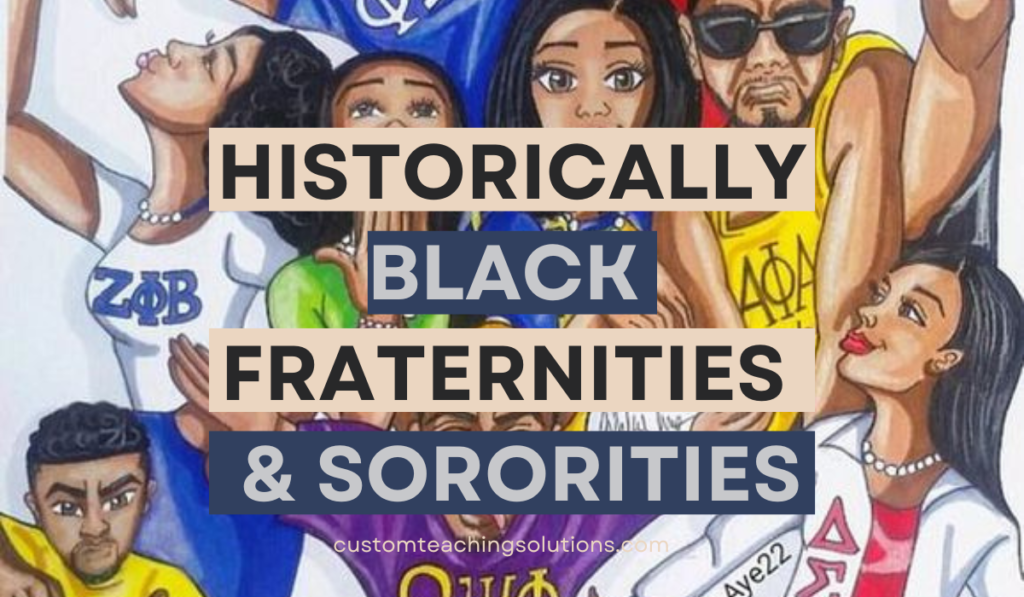
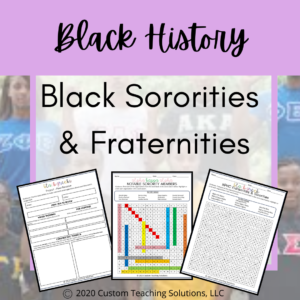







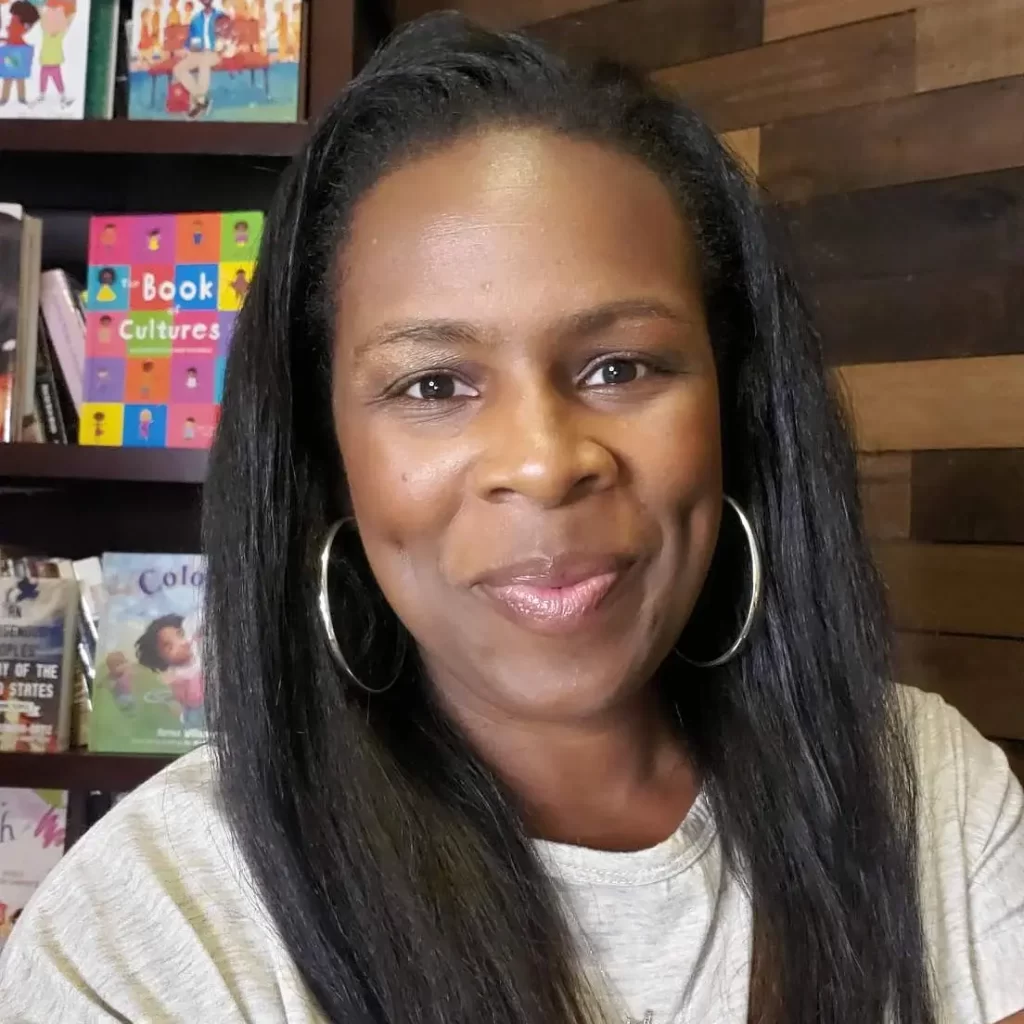

1 thought on “9 Powerful People – What are Black Greek organizations? Why are they important?”
Pingback: Three Fun and Unique Black History Month Bulletin Board Ideas - Custom Teaching Solutions